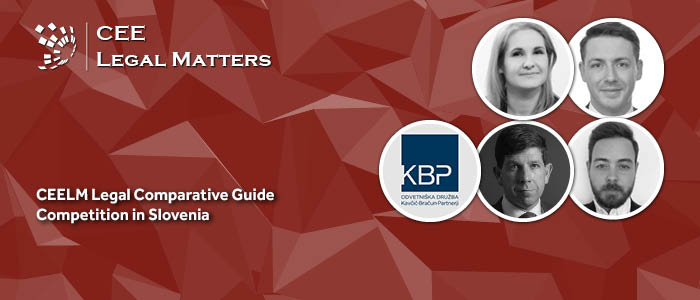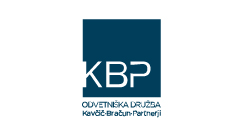Contributed by Kavcic, Bracun & Partners.
1. What are the main competition-related pieces of legislation in the Republic of Slovenia?
Competition law in the Republic of Slovenia is primarily regulated by the Prevention of Restriction of Competition Act (ZPOmK-2), along with the directly effective and applicable European Union laws. Two competition law implementing acts are in effect, namely (i) Decree on the procedure for granting immunity from, and reduction of, administrative sanctions for companies who are parties to cartels, and (ii) Decree on the concentration of companies notification form. Additionally, the Criminal Code prescribes a criminal offense of illegal restriction of competition. Furthermore, certain sector-specific acts also include provisions concerning competition, such as the Mass Media Act, which especially provides for certain additional restrictions regarding concentrations, and the Agriculture Act, which provides for specific regulation of both material and procedural aspects (including certain fines/consequences) of certain prohibited acts for undertakings with substantial market power.
2. Have there been any notable recent (last 24 months) updates of the Slovenian competition legislation?
There have been some notable updates in the competition legislation in the Republic of Slovenia within the last 24 months. The new Prevention of Restriction of Competition Act (ZPOmK-2) entered into force on October 26, 2022, and it became applicable three months after its entry into force. The new ZPOmK-2 defines a new unified procedure for establishing infringements of competition law together with the imposition of penalties on legal entities for breach of competition rules – administrative sanctioning and provides for transposition of the provisions of Directive (EU) 2019/1 of the European Parliament and of the Council of December 11, 2018, to empower the competition authorities of the Member States to be more effective enforcers and to ensure the proper functioning of the internal market. To reflect the legislative changes, novel decrees were adopted, providing some updates. Additionally, the ZPOmK-2 was recently amended (i.e., amendment ZPOmK-2A was adopted on January 30, 2024, entering into force on February 24, 2024). With the amended ZPOmK-2, the control over implementation and breaches of Regulation (EU) 2019/1150 of the European Parliament and of the Council of 20 June 2019 on promoting fairness and transparency for business users of online intermediation services and Regulation (EU) 2022/1925 of the European Parliament and of the Council of 14 September 2022 on contestable and fair markets in the digital sector and amending Directives (EU) 2019/1937 and (EU) 2020/1828 (Digital Markets Act) is entrusted on the Slovenian Competition Protection Agency(Javna Agencija Republike Slovenije za Varstvo Konkurence; CPA), while also certain other modifications concerning inter alia access to file and information, remedies, limitation period, leniency, and administrative sanctions have been introduced. Furthermore, the CPA published for the first time the guidelines for setting administrative fines, which provide not only guidance for the determination of the amount of fines in antitrust proceedings but also regarding the setting of fines in concentrations, procedural breaches, and certain breaches of the Agriculture Act.
3. What are the main concerns of the national competition authority in terms of agreements between undertakings? How about the sanctioning record of the authority?
The Slovenian Competition Protection Agency considers as its priority the most serious violations stemming from the anti-competitive agreements. No further division that would indicate a higher priority of certain specific issues was indicated by the CPA in its publicly available communications.
Administrative sanctions for competition law infringements in the Republic of Slovenia were introduced only recently with the new ZPOmK-2. Previously, fines were set in the misdemeanor procedure, which was usually conducted as a follow-on procedure to administrative proceedings, in which a competition infringement is identified and any remedies set. The sanctioning record of the CPA is difficult to assess since case law on misdemeanor proceedings is limited. However, due to the introduction of the new unified procedure, which no longer requires the conclusion of the administrative procedure first, and also the publication of the sanctioning guidelines, it can be expected that the sanctioning activity of CPA could increase. For example, according to publicly available information, the CPA already imposed the first administrative sanction in an administrative procedure in December 2023 in a settlement procedure. The settlement concerns the finding of infringement by the adoption of an anti-competitive agreement in the form of rules of undertakings (i.e., Article 5 of the ZPOmK-2 and Article 101 of the TFEU) by the Veterinary Chamber of Slovenia with the introduction of rules on advertising and offering discounts for their services by the members of the chamber. CPA imposed an administrative sanction of EUR 43,000 for an infringement that lasted almost eight years. This is the first decision issued by the agency on the basis of the new ZPOmK-2 and the first issued on the basis of settlement submission. The decision is pursuant to the publicly available information not yet final.
4. Which competition law requirements should companies consider when entering into agreements concerning their activities on Slovenian territory?
The CPA regularly studies and follows the recent practices of the European Commission and the Courts of the European Union, along with their guidelines. The competition law requirements when entering the agreements on Slovenian territory are therefore in the majority of instances the same or at least very similar to those developed within the European Union. Consequently, the requirements and prohibitions set and developed in European Union law are thus applicable and should be considered.
5. Does a leniency policy apply in the Republic of Slovenia?
The leniency policy in the Republic of Slovenia is applicable and is modeled on the European Commission’s leniency policy. It is regulated by the Prevention of Restriction of Competition Act (ZPOmK-2) and the Decree on the procedure for granting immunity from, and reduction of, administrative sanctions for companies who are parties to cartels. The CPA acknowledges the potential of leniency policy for the purpose of detection of cartels and considers raising awareness regarding leniency proceedings as one of its priorities.
In addition to leniency, there is also an option for settlement submission. In the latter proceeding, the administrative penalty for undertakings can be reduced by up to 20%.
6. How is unilateral conduct treated under Slovenian competition rules?
Under Slovenian competition rules, unilateral conduct is regulated with a prohibition of abuse of dominant position, which is modeled on the prohibition under Article 102 TFEU. Dominant position is defined as the ability of an undertaking to act to a significant degree independently of its competitors, clients, or consumers. Furthermore, a dominant position is presumed in cases of a market share of an undertaking in the territory of the Republic of Slovenia above 40% or, in the case of joint dominance, a market share of more than 60%. Abuse is not defined in the ZPOmK-2, but only a non-exhaustive list of examples is noted, such as in the event of a dominant undertaking (i) directly or indirectly imposing unfair purchase or selling prices, or other unfair trading conditions, (ii) limiting production, markets or technical development to the prejudice of consumers, (iii) applying dissimilar conditions to equivalent transactions with other trading parties, thereby placing them at a competitive disadvantage, or (iv) making the conclusion of contracts subject to the acceptance of supplementary obligations which, by their nature or according to commercial usage, have no connection with the subject of such contracts.
7. Are there any recent local abuse cases of relevance?
There is one recent local abuse case of relevance, which ended with a commitment decision, as have the majority of proceedings in recent years. That recent case (date of commencement: November 4, 2021) concerned the alleged abuse of dominance by the company PLASTKOM d.o.o., wherein the company conditioned its further business cooperation with performers of waste candle management operations on the conclusion of new contracts, requiring contracting partners to deliver all collected waste candles for processing to PLASTKOM d.o.o. Additionally, PLASTKOM d.o.o. purportedly inflated processing fees, especially for electronic candles, and applied unequal conditions for comparable deals with contracting partners, placing them in a competitively disadvantaged position. On March 30, 2023, the CPA also stopped the proceeding against the company Telekom Slovenije d.d., with the case concerning the alleged abuse of the company’s dominant position regarding access to the broadband network market. The case was initiated in 2004 but was stopped without finding any infringement, after it was returned by courts for re-examinations following previously adopted infringement decisions in two instances, due to the difficulties with obtaining all relevant information for establishing infringement for such time so far in the past. Based on the publicly available information, one case that is not yet closed, concerns the conduct of the company Pro Plus d.o.o. in the field of distribution of audio-visual content. That case was commenced on February 1, 2017, with no further information publicly available on its status.
8. What are the consequences of a competition law infringement?
The consequences of competition law infringements depend on their severity and nature. Thus, the CPA can issue a fine or administrative penalty, but it also has several other options. The CPA can in particular order the undertaking to stop with the infringement, and may impose on the undertaking certain measures, which it deems suitable to remedy the infringement and its consequences, such as the sale of activity, transfer of intellectual property rights, etc. The CPA may furthermore in certain instances inter alia revoke certain decisions, such as the commitment decision, or the decision on the compatibility of concentration, and commence with the proceeding.
Regarding the proceedings and rules regarding sanctions and finding of violations, the new ZPOmK-2 introduced a new unified procedure. Previously the CPA had to identify violations of competition law in administrative procedure, while the fines were levied upon undertakings in a separate misdemeanor procedure. Now both are decided in a single administrative procedure. Regardless, the ZPOmK-1 may still be applicable in some cases in the future. The provisions on administrative sanctioning of undertakings per the ZPOmK-2 apply to breaches that can be considered administrative offenses and are committed after the entry into force of the ZPOmK-2. In addition, the administrative and minor offense proceedings that are not yet final at the date of applicability of the ZPOmK-2 have to be finalized in line with previously applicable procedures. However, if the rules from the ZPOmK-2 could be considered more beneficial for the offender then the ZPOmK-2 rules may apply also in those cases. However, it is not clear yet, if provisions on administrative sanctions could be regarded as more beneficial for the offender in practice and their application for older cases will be settled through case law. There are also certain specifics for transitory situations concerning damages proceedings.
The CPA can impose an administrative sanction in the amount of up to 10% of the undertaking’s annual turnover in the preceding business year for restrictive conduct (anti-competitive agreements, abuse of dominant position, violation of commitment decision, etc.), and up to 10% of the annual turnover of the undertaking concerned along with other entities within the group in the preceding business year for concentration-related violations (failure to notify or suspend transactions pending clearance, violation of decision on incompatibility of concentration, etc.). In broader cases of obstruction of the CPA’s activities (e.g., transmission of incorrect or misleading information, failure to respond to a summons), the CPA may impose an administrative sanction in the form of periodic payments or of a single pecuniary amount not exceeding 1% of the annual turnover of the undertaking in the preceding business year. The periodic payments option may be used particularly to compel undertakings to submit complete and accurate information upon request, and to comply with judicial decisions, agency findings of infringement, interim measures, commitments, etc. In these instances, the CPA may impose on the undertaking a periodic administrative sanction in the form of a daily fine of up to 5% of the undertaking’s average daily total turnover in the preceding business year.
The parent undertaking can also be found responsible and is jointly responsible for the payment of administrative fines (the financial obligation of each undertaking in that regard cannot exceed the highest amount for which the undertaking would be responsible if it alone committed the administrative offense). Specific rules are in place also regarding legal and commercial succession, issuance of administrative fines to business associations, accomplices, etc.
Additionally, penalties for breach of competition rules are defined for responsible individuals and individuals who control another undertaking and are issued in misdemeanor proceedings and can include payment of the fine:
- for the responsible individual (e.g., CEO, responsible employee of the company): from EUR 5,000 to EUR 30,000
- for an individual who controls another undertaking: from EUR 3,000 to EUR 15,000
Instead of a fine, the CPA can also issue a warning but only for the responsible individuals and individuals, who control another undertaking.
Regarding major violations, the limitation period is five years from the occurrence of a violation of competition law, but in any case, the procedure for the imposition of fines is not allowed or the administrative penalty cannot be issued after ten years from the occurrence of the breach.
In administrative sanctioning proceedings (for undertakings), despite the mentioned absolute limitation period, the latter is nevertheless suspended and does not run during the conduct of the ordinary or extraordinary judicial proceedings against a decision on administrative offense, or when it cannot start or continue pursuant to the law, and recommences after the judicial decision becomes final. In that regard, the time elapsed before the suspension is counted toward the limitation period. Additionally, in the event, that the final decision or court ruling is revoked in the extraordinary judicial proceeding and the absolute limitation period runs out until such time or would run out in a period shorter than two years, the limitation period in a new proceeding on administrative fine amounts to two years.
Undertakings and the responsible persons may additionally be held criminally liable for the criminal offense of illegal restriction of competition pursuant to Article 225 of the Criminal Code, with the prison sentence envisioned in a span from six months to five years. In that regard, the Liability of Legal Persons for Criminal Offences Act provides for certain penalties for legal entities for the violation of the above-mentioned criminal offense. The penalties are in particular the (i) penalty payment of at least EUR 50,000 or at most the amount of two hundred times the resulted damage or unlawfully acquired proceeds, obtained with a criminal offense; (ii) confiscation of assets of the legal person (instead of penalty payment); and (iii) cessation (start of liquidation proceedings) of the legal entity, if the business/activity of the legal person was in total or to a large extent used for the execution of criminal offenses (instead of penalty payment). Furthermore, for a certain period of time, a prohibition to conduct certain business activities of the legal entity and a prohibition of disposal of the company’s securities may also be imposed, while any monetary benefit obtained with or due to the criminal offense can be taken.
Additionally, note that the undertakings may also be subject to private damages proceedings.
9. Is there any competition law requirement in case of mergers & acquisitions occurring or impacting the Slovenian market?
Mergers & acquisitions need to be notified to the CPA in the event that both legal and economic conditions are fulfilled. The legal condition is fulfilled in the event of a change of control on a lasting basis over an undertaking. This could occur due to (i) the merger of two or more previously independent undertakings or part of undertakings, (ii) the acquisition of direct or indirect control over the whole or parts of one or more other undertakings, or (iii) the establishment of a full-function joint venture. As part of the economic condition, the following merger control thresholds for the obligation to notify the merger to the CPA currently apply:
(i) joint annual turnover on the Slovenian market in the business year prior to the merger of all the undertakings concerned jointly must be above EUR 35 million, and
(ii) either:
- annual turnover on the Slovenian market in the business year prior to the merger of the target is at least EUR 1 million, or
- in cases of joint ventures annual turnover on the Slovenian market in the business year prior to the merger of at least two undertakings concerned is above EUR 1 million (at least two parties must each individually achieve a turnover of EUR 1 million in Slovenia for this threshold to be met).
With a requirement that annual turnover in the Slovenian market is the only relevant turnover for the establishment of a merger control threshold and especially with a requirement that the target must have an annual turnover in Slovenia, merger control is limited to mergers having a possible effect on the Slovenian market.
If EU thresholds are met, a merger does not have to be notified to the CPA but should be notified to the European Commission only.
In addition, companies have to inform the CPA of, and the CPA can review, the mergers in which the above-stated thresholds are not met, but undertakings concerned have a joint market share on the relevant market in Slovenia of above 60%. The undertakings involved in a concentration must inform the CPA of such concentration within 30 days of the conclusion of a contract, announcement of a public bid, or the acquisition of a controlling interest. The CPA may also prompt the undertaking concerned to inform it of a concentration. The CPA may at its sole discretion then request the undertakings concerned to notify the concentration to the CPA within 25 business days from the day on which the parties informed the CPA about it. Following such request from the CPA, notification is mandatory and the same rules as for the other notified mergers apply. There are no implications for parties that do not voluntarily (without any request or prompting) approach the CPA in such circumstances, however (i) non-compliance with a request to notify concentration, or (ii) breach of stand-still obligation, represent administrative offenses, for each of which the CPA can issue an administrative penalty.
In cases where the jurisdictional thresholds are met, notification is mandatory, and a stand-still obligation applies until a final decision by the CPA. Furthermore, a stand-still obligation applies to mergers, which do not reach annual turnover thresholds, if the CPA requires parties to notify a merger due to high market shares (see above), from the day when parties are informed about the CPA’s request to notify. Notifying parties can, however, ask the CPA to allow them to exercise rights from the merger if this is required to safeguard the value of the intended investment or for the performance of services in the public interest.
10. What is the normal merger review period?
ZPOmK-2 provides only an indicative and non-mandatory timeline regarding the merger review. The review period, therefore, varies depending on the potential contentiousness of the notified merger, with the indicative timeline being the following.
The deadline for filing a notifiable transaction is 30 days after the conclusion of the contract, the announcement of the public bid, or the acquisition of a controlling interest, whichever is first. The running of this deadline commences on the day of the first of those instances. In cases where the CPA requires parties to notify a merger due to their high market shares, a 30-day deadline for filling notification starts to run from the day when parties are informed about the CPA’s request to notify.
For a review of the merger by the CPA, there is only an indicative timetable, which is not binding for the CPA. Within 25 business days from the receipt of the complete notification the CPA should issue:
(i) a decision finding that the notified merger is not notifiable,
(ii) a decision clearing the notified merger (first phase decision), or
(iii) an order commencing a second-phase review.
In cases where the notifying parties offer remedies in the first phase, the deadline for issuing a first-phase clearance decision or commencement of a second phase is prolonged for an additional 15 business days.
In a second phase review, the CPA should issue a decision clearing or banning the merger within 60 business days from the issuing of an order on the commencement of the second phase review. In cases where the notifying parties offer remedies in the second phase, the deadline for issuing a decision is prolonged for an additional 15 business days. The remedies may per the new amendment be proposed at the latest within 45 days from the order commencing a second-phase review, with later submissions to be considered only exceptionally.
Note that “business days” excludes any days when the CPA does not work, namely weekends and public holidays. The deadline runs from the day after the day on which a full and complete notification is received by the CPA. The CPA however is not obliged to issue a confirmation of completeness, so it is difficult to assess when the indicative timeline would start to run.
11. Are there any fees applicable where transactions are subject to local competition review?
For the purpose of merger review, an administrative fee in the amount of EUR 2,000, determined by the Administrative Fees Act, is payable.
12. Is there any possibility for companies to obtain State Aid in the Republic of Slovenia? If yes, under what conditions?
State Aid may be obtained in the Republic of Slovenia, under the conditions prescribed by the Treaty on the Functioning of the European Union (Articles 107, 108, and 109).
13. What were the major changes brought by the COVID-19 pandemic? Have any of them stuck and how likely is it for these changes to continue to do so in the foreseeable future? crisis in the field? How likely is it for these changes to stick?
The COVID-19 measures that concerned the CPA were primarily focused on procedural aspects, i.e. the deadlines and method of submissions. These changes are no longer in place. Nevertheless, during the COVID-19 lockdown(s), the CPA changed its approach regarding communication, with more communication occurring via electronic messages as well as meetings taking place online. This practice has so far stuck and is still present.
There were no changes with respect to the application of substantive rules or evaluation of cases by the CPA.






